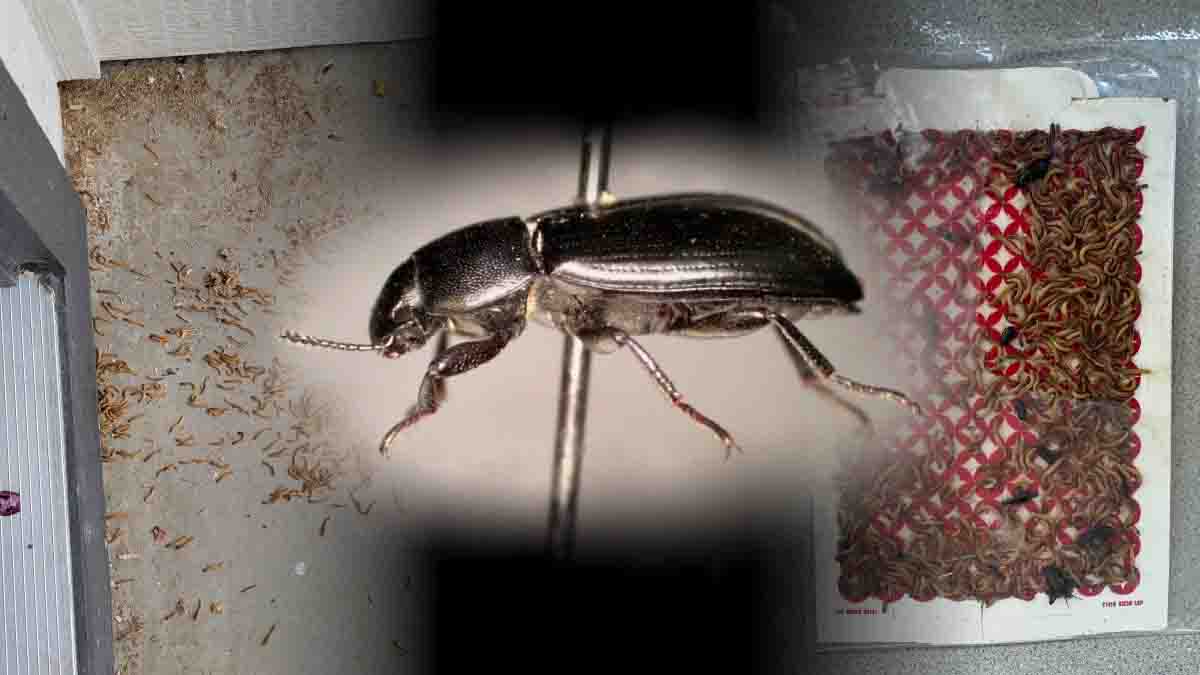Beetle Discovery
April 30, 2025
A University of Idaho entomologist confirmed an exotic beetle native to the Mediterranean basin has arrived in Idaho’s Treasure Valley, where it’s infested homes with oodles of tough-to-control larvae.
The insect, Opatroides punctulatus Brullé, is part of the family Tenebrionidae, commonly known as darkling beetles — encompassing about 20,000 ground-dwelling beetle species that feed on organic matter and debris in soil.
Armando Falcon-Brindis, an Extension specialist of entomology based at U of I’s Parma Research and Extension Center, believes the species is already well established in the region and has been commonly mistaken for wireworms in recent years.
The beetle is bound to remain a nauseating pest for certain Treasure Valley homeowners, but Falcon-Brindis is optimistic that it should have only a minimal impact on Idaho agriculture. Falcon-Brindis, his master’s student Henry Trujillo and Jason Thomas, UI Extension educator, Minidoka County, published a paper about the beetle discovery, “First Report of the Darkling Beetle, Opatroides punctulatus Brullé, 1832 (Coleoptera, Tenebrionidae) in Idaho, USA, an expanding adventive species in the Pacific Northwest,” in the January 2025 issue of the journal Check List.
Falcon-Brindis first encountered the beetle in July 2024, after receiving a plea for help from an Eagle woman, who sent photographs of larvae covering her back porch. He thought better of dismissing the report as a routine case of wireworms.
“I’d rather go to the property and do the sampling myself. What if this was something different?” Falcon-Brindis recalled.
The infestation was already on the decline when Falcon-Brindis and Trujillo arrived and found both larvae and adult beetles. At the peak of the infestation, wormlike larvae filled every dark crevice of the home, including under the stove, beneath mats and behind curtains. Despite repeated treatments by a pest-control service, the larvae remained as abundant as ever. The property owner would sweep for larvae four or more times per day, yet they’d return as fast as she could clean.
“What they were doing there was very simple. They were looking for a place to pupate and overwinter,” Falcon-Brindis said.
Falcon-Brindis and Trujillo took soil samples from the turf surrounding the Eagle home, as well as from an adjacent hay field. Where the soil was extremely dry, testing confirmed upwards of 30 larvae per square foot. Larvae densities were much lower in moister soil in the yard, and there were no larvae found in samples from the adjacent irrigated farm field. Based on testing and his research about the species, Falcon-Brindis has concluded the beetle prefers dry soils with lots of organic matter.
“That makes a lot of sense because if you think about their native distribution in the Mediterranean area, they’ve got hot, dry summer and wet winter, very similar to what we have in the Treasure Valley,” Falcon-Brindis said.
He advised the homeowner to water a buffer of grass surrounding the home this summer to keep the beetles at bay.
After visiting the home in Eagle, Falcon-Brindis concluded a pest report from a Starr homeowner previously attributed to wireworms was actually darkling beetles that were bought in on hay bales, and he confirmed a stronghold of beetles at a third home in Emmett during August. In hindsight, ISDA now recognizes that several pest reports attributed to wireworms in recent years were actually caused by darkling beetles.
The beetle was first confirmed in the U.S. in a 2009 publication documenting its presence in California. It’s since been confirmed in several areas of central California. A 2015 publication confirmed the discovery of the species in western Nevada, where it was described as a nuisance for homeowners but not a significant agricultural pest. Falcon-Brindis suspects it hitchhiked to southwest Idaho on agricultural shipments — possibly hay.
Falcon-Brindis would like to research the beetle’s distribution in Idaho, its biology and how soil moisture levels affect beetle population thresholds. It’s unlikely the beetle will be a high priority for research, however, as it doesn’t appear to cause significant damage to agricultural crops.
“We should keep an eye on this. Even if farm fields in the Treasure Valley are not necessarily infested with these beetles, dry lands and non-irrigated crops could be ideal for these beetles to thrive,” Falcon-Brindis said.

About the University of Idaho
The University of Idaho, home of the Vandals, is Idaho’s land-grant, national research university. From its residential campus in Moscow, U of I serves the state of Idaho through educational centers in Boise, Coeur d’Alene and Idaho Falls, nine research and Extension centers, plus Extension offices in 42 counties. Home to more than 12,000 students statewide, U of I is a leader in student-centered learning and excels at interdisciplinary research, service to businesses and communities, and in advancing diversity, citizenship and global outreach. U of I competes in the Big Sky and Western Athletic conferences. Learn more at uidaho.edu.






